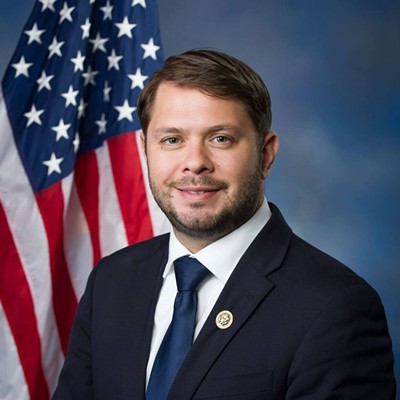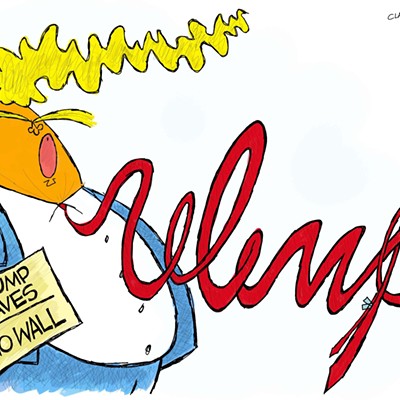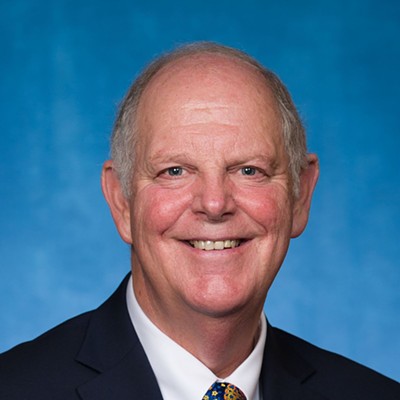THE CLOSERS
As of our deadline, the federal government is shut down. We'll see how long this silliness goes on, but we tend to agree with the pundits who argue that it's probably best to have this fight now rather than a bigger fight over the debt limit in a few weeks.
Unless, of course, we also end up having another big fight over the debt limit in a few weeks.
At any rate, things are likely to be messy for awhile.
As the deadline to fund the federal government was just hours away on Monday, Sept. 30, Sen. John McCain probably lost more of his supporters on the right when he told reporters that the GOP "can't win" the shutdown showdown.
Meanwhile, Congressman Ron Barber lost some of his supporters on the left when he joined with GOP lawmakers on the final Republican bid to keep the federal government open. The House deal: The Affordable Care Act's individual mandate to purchase health insurance would have been delayed for a year and the Obama administration would have been prohibited from helping congressional staffers with the cost of purchasing health insurance on the health-insurance exchanges.
The legislation was rejected by the U.S. Senate, which triggered the shutdown.
Barber—who announced he'd be donating his salary to charity during the shutdown—said in a prepared statement that he voted with the GOP because "a government shutdown would hurt the economies of Arizona and our nation."
Barber noted that the Affordable Care Act's health exchanges, where people can shop around for private health insurance, were scheduled to open this week, shutdown or no shutdown.
"Under the Affordable Care Act, many Americans will begin purchasing health insurance for the first time," Barber said. "Giving them an extra year before charging them penalties is the right thing to do. Tonight my vote to delay the individual mandate for one year did just that."
Barber, who represents a district where Republicans have a slight voter-registration advantage, was one of nine Democrats to join with Republicans on the vote. Arizona's Kyrsten Sinema (CD-9) was another.
THE 2014 RACE IS ON
Republican Martha McSally made it official this week: She wants to take on Congressman Ron Barber again next year.
McSally's announcement on Tuesday, Oct. 1, was no big surprise, given that she had already filed as a congressional candidate with the FEC and had been raising money for a campaign.
McSally came within a few thousand votes of unseating Barber last year in one of the closest congressional races in the country. It was a strong performance by a political novice who didn't even know who Congressman Paul Ryan was when she got into the congressional campaigning game.
But McSally isn't the only Republican who wants to take on Barber in 2014. Last week, Ed Martin announced he wanted to run for the Congressional District 2 seat as well.
Martin, who has worked in Republican politics in New York state (including stints as spokesman for former New York senator Al D'Amato and as a senior advisor to the state senate majority leader), is a conservative who has filled in from time to time for Jon Justice, the Best of Tucson®-award-winning morning radio talk jockey.
Martin showed that he had plenty of East Coast chutzpah earlier this week when he urged McSally to get out of the race because she would be a liability in protecting Davis-Monthan Air Force Base from closure.
"With all due respect to the Colonel, the fact that she sued the Pentagon and embarrassed them on national television makes her the wrong person to send in to lobby them on behalf of Southern Arizona," Martin said in a press release. "Most people who have been sued and embarrassed by someone would not be favorably inclined to assist them if they came forward a few years later and asked for help on something."
Martin knocked McSally for her lawsuit against the Pentagon, which she filed because she was upset over a policy requiring female soldiers to wear traditional Saudi dress, including headscarves. McSally prevailed in court, but Martin suggested in his press release that hard feelings might still linger.
"It's basic human nature and we must not discount the fact that the Pentagon is a huge bureaucracy that can be plagued by residual animosity over getting sued for a policy intended to protect female military personnel stationed in Saudi Arabia due to the failure of the government to have a Status of Forces agreement in place to extend civil protections to our men and women," Martin said.
There's a third GOP candidate interested in the CD2 race: Shelley Kais, who was actually on Team McSally last year.
SPEAKING OF CONGRESSIONAL RACES
The Skinny hears that House Speaker Andy Tobin is getting closer to announcing a run for the U.S. House of Representatives in Congressional District 1, the sprawling rural district that stretches from Oro Valley across the eastern half of the state and takes in Flagstaff, as well as several of the state's Native American reservations.
Tobin's entrance into the race is likely to be bad news for state Rep. Adam Kwasman, who announced his own plans to run for the seat earlier this year.
Tobin has had a longer political career (Kwasman was only elected to the state House in 2012) and would probably have an easier time raising money.
But both state lawmakers have to deal with a wild card: Rancher and oilman Gary Kiehne, who announced his plans to run last month. Kiehne is a political newcomer, but we hear he has deep pockets and can self-fund a campaign.
CD1 is now represented by Democratic Congresswoman Ann Kirkpatrick, who won a close race against Republican Jonathan Paton last year. While the district has Democratic edge, some of those Democrats are conservative rural types who might cross over for the right GOP candidate, so it's a competitive district.
Tobin, who is evidently unsure of his appeal in a district where he would have to compete, is doing his best to make CD1 more Republican-friendly territory by joining with his fellow GOP lawmakers to sue in federal court to overturn the voter-approved law that created the Independent Redistricting Commission. Tobin et al are arguing that the U.S. Constitution gives legislatures the sole power to draw congressional maps, so the IRC should be stripped of the power and lawmakers should be able to draw a new map.
The Arizona Daily Star railed against the lawsuit last week with an editorial that included this wildly inaccurate assertion in defense of the IRC: "A quick look at the latest Arizona voter registration report, which notes voters' party affiliation, shows no district has an insurmountable advantage for either party."
No district has an insurmountable edge? That must have been a very quick look at the latest voter registration counts. How about Congressman Raul Grijalva's district, where 123,000 voters are Democrats and 61,000 are Republicans? Or Congressman Paul Gosar's district, where 155,000 voters are Republicans and 78,000 are Democrats? Or Pima County's Legislative District 3, where 42,000 voters are Democrats and just 14,600 voters are Republicans? Trust us: A little googling of the numbers will show that competitive districts remain a rarity in Arizona, despite independent redistricting. There are reasons for that, based on geography, communities of interest, and other factors, but let's face it: If every district were competitive, our legislative races would be a lot more interesting. Arguing that there are no "safe districts" suggests a fundamental misunderstanding of the basics of Arizona's political landscape.
Jim Nintzel hosts AZ Illustrated Politics, airing at 6:30 p.m. every Friday on PBS 6. This week's program features a City Council election forum with Ward 3 Democratic incumbent Karin Uhlich and her Republican challenger, Ben Buehler-Garcia.















